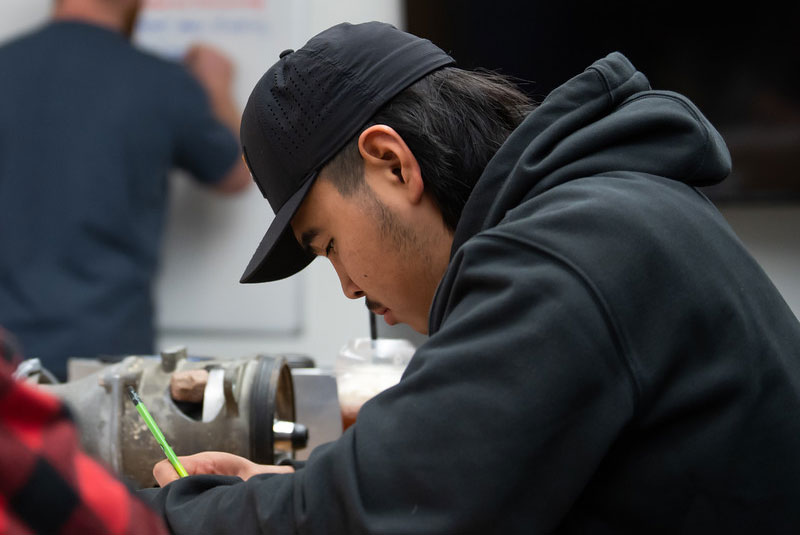Being Resilient with Dennis Humphrey
by Vicki Heisser |
This semester PWSC professor Dr. Dennis Humphrey is teaching a course on Alaska Native literature. He took some time to talk with me about this course and the importance of studying this literature.
As part of completing their degree requirements, students need an Alaska themed course, and Dr. Humphrey saw offering a course on Alaska Native literature as a chance to help students fulfill that requirement and learn more about Alaska Native literature. As someone who specializes in American literature, with an emphasis in Native American literature, Humphrey has a deep interest in the works of indigenous peoples.
Humphrey’s class shows students not only how Alaska Native literature fits within the context of literature from other indigenous peoples, but also, as he states, “Western literature depictions of native indigenous peoples.” He continues, “it really gives a better understanding not just of what Alaska Native literature is, but where it fits in the broader scheme of literature in general.”
Part of his course also focuses on the oral tradition and keeping Alaska Native stories alive. “When Alaska became a state in 1959, there were somewhere on the order of 300 different native languages being spoken in the state, and today are about 20. This shows how quickly these sort of traditions can just disappear. And once they're gone, if they were strictly oral traditions, they're just gone.”
Humphrey explains that the bulk of the course involves “looking at the stories of and tales and myths of Native Alaska literature. But we're also looking at similar stories from other indigenous groups so that we can have a basis for comparison, for talking about them. So that's the way we're looking at it, comparing different types of stories and different themes, looking for similarities with other literature that is out there, but also looking for differences.” Comparing and contrasting different works, and considering them in conversation with one another, is an important part of this course. Humphrey wants to ensure that the literature in the course, and Alaska Native peoples themselves, aren’t simply seen as “novelties.”
The goal is to be inclusive. As Humphrey shares, “There is a tendency sometimes to look at things like this as though they are separate. It's almost like looking at some topic behind glass at a museum. So, it's put on this little pedestal.” Humphrey wants to change that image and make Alaska Native literature part of the literary conversation.
He shared some of the books he is using this semester to teach the course. He is using a book called Words of the Real People, written by faculty at the University of Alaska. He is also using the novel, Bird Girl and The Man Who Followed the Sun, while also integrating other, more contemporary works. As he continues to teach this course in subsequent semesters, his goal is to try to include more free online resources into his syllabus. “I've used quite a bit of those in the course where there are links to information because there's a ton of that stuff out there. It's just maddeningly not catalogued for easy access. Each year I teach this course, there will be more of that material brought in and less of the books for students to have to buy because books are expensive, especially ones that are not mass marketed.”
As our interview came to a close, I asked Humphrey if he had a favorite quote from one of the books his class is reading this semester. Though he couldn’t think of a specific quote, there was a theme that stood out to him. He describes one of the stories about fishermen who come upon a pod of orcas surfacing. In their culture it is taboo to disturb the orcas, so they all fear they are doomed, but the head fisherman talks to the orcas, apologizing for getting so close. The two make a pact, with the fisherman making a peace offering, giving the orcas part of the day’s catch. Humphrey goes on to explain, “And so instead of reacting violently or just waiting for doom, they approach it from the idea of ‘we're sorry that this happened, how can we make it better? And how can we move forward the relationship between us and your group?’ And I think that's very instructive of a way that different groups of people can coexist because people are going to trespass on each other. Sometimes they are going to say something and not know it was offensive or not mean to have offended somebody. And that happens. What is beneficial is a road back to making it okay, so that it doesn't turn into another reason not to like another group.”
While Dr. Humphrey’s course was originally a seated course, in response to the CORVID-19 virus, the University of Alaska transitioned most courses to online format to minimize transmission of the virus. Dr. Humphrey, a veteran of online instruction and a military veteran with two deployments to Iraq, said that taking this course to an online format won't be a problem. "Look at it this way," he said. "The cultures we are studying in this course are still here for us to study because those cultures and their people are resilient. We can be too."









